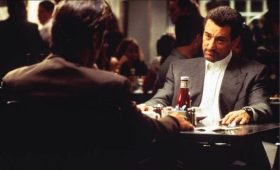If you were to gather a group of fledgling playwrights and ask them to discuss their chosen profession, chances are good that before long the conversation will turn to the difficulties many feel they are encountering with the new play development process that has only recently come into being in this country. Following a build-up of the debate, the discussion crescendoed to a deafening roar in recent weeks, as playwrights Richard Nelson and Madeline George, dramaturg/agent Morgan Jenness and Time Out New York’s David Cote participated in a panel about the topic, sponsored by the Summer Play Festival.
During the discussion, it became clear that many playwrights believe the theatre industry has relegated their work to that dark ring of the underworld known as “Development Hell,” a derogatory term used to refer to the many programs across the United States whose mission is ostensibly to encourage and facilitate the development of new plays. For despite the intentions of development programs, many new works, alas, do not ever advance to an actual production.
There was a time in the early 1980s when new theatre companies seemed to be thriving all over America. These institutions were ardently dedicated to the work of emerging playwrights. Thus, were you to attend a show at venues such as Playwrights Horizons or Primary Stages, you would have encountered the early (and often greatly flawed) works of writers who in the current day are considered to be masters. Writers such as Wendy Wasserstein, John Patrick Shanley, and Marsha Norman (all of whom have gone on to win the Pulitzer Prize) all enjoyed productions — actual productions — of their early works upon these stages.
“Playwrights Horizons and the Public Theatre [in New York City],” said one actor to me recently, “used to each have seven shows running at once.” Recent economic constraints, however, have prevented more than one or two at a time from being produced at these theatres. Thus the emergence of play development programs, which seek to present readings of new works at a lower cost, in an attempt to make up for the lack of a full production.
The new play development process is as varied as the theatres and institutions offering programs. Typically, however, playwrights who have been selected from a seemingly inexhaustible pile of submissions are invited to the sponsor’s premises for a period of time ranging from one week to a month, with the purpose of developing their work. In some circumstances, there is no formal presentation for producers at the end of the session. In others, theatrical producers and theatre companies across the country are fervently petitioned to attend to final presentation, which might employ highly recognizable actors to read from scripts propped up on music stands while sitting on stools.
One danger, some writers are alleging, concerns what this relatively new trend of development programs is doing to the actual creation of new plays. Madeline George of 13P, a production company in New York City that seeks to develop new plays by actually producing them, thereby allowing playwrights to gauge audience response and interest and to then rewrite accordingly, warns that there are “lots of implications [of this new-play development procedure] for people who are writing.” She says that many young writers have become “fearful of writing in ways that were formally or politically risky or challenging,” worrying that this might knock their play out of the selection process.
Richard Nelson, who heads the Yale playwriting program and whose plays include Rodney’s Wife and the recent Frank’s Home, which was produced Off-Broadway this season, says that the term development “implies that something outside of ourselves is going to tell us what to do.”
“Making the play work in a production situation” is paramount, Nelson said, adding that the things needed to mount a play are that “there be someone: to write it, act in it, direct it, design it and produce it.” He says that current play development practice causes a writer to justly feel that “all this other stuff is happening and [still] my play isn’t being produced, under the guise that everybody’s helping me.”
Nelson went on to say that he has radically altered the construct under which Yale’s prestigious playwrighting program functions, treating students as “private individual artists” and promoting their ability to write their plays using their “own voice,” until the work is complete.
Certainly, many in the community agree with his sentiment. In the February 21 edition of LA Weekly, Edward Albee was noted to say the following: “Go [expletive deleted] yourself; if you don’t want to do the play I wrote, do another play.” And as Scott McMorrow points out in a letter to The Loop, a magazine with rants, raves, and submission notices distributed by Gary Garrison, (in a capacity separate from his role as the new head of the Dramatists Guild of America), Mr. Albee has the clout to make such pronouncements. “I agree,” writes Mr. McMorrow, “that… writing a script is an act of individual creativity.” But he says that collaboration during the development of a new play — be it during a production or at a play development program — can be a wonderful thing. “Writers hear all the time in creative writing classes, seminars, and conferences that their words are their own, which they are. They also hear that they must defend their words on pain of death. And they should defend their work. But not to its own detriment.”
It should be noted that the development process has produced more than a few recent stars. Writers such as David Lindsay-Abaire (last season’s Rabbit Hole) and Adam Rapp (Pulitzer finalist for Red Light Winter) have each developed work at institutions like the National Playwrights Conference, held annually at The O’Neill Theater Center in Waterford, Connecticut each summer, and the Sundance Institute Theatre Laboratory.
Ultimately, it is a challenging process for any new play by an unknown playwright (and often, even known ones) to be fully developed — i.e., given a full production. It’s difficult enough to write a play in the first place, but in contrast to the lot of fiction authors and poets, a playwright’s work is not complete until it is performed before a live audience. Today many feel that this process is being hampered by the very people and programs that are supposed to be nurturing it. It remains to be seen whether collectives like 13P can offset this trend, but it seems clear that the strategy of waiting for institutions to do the right thing isn’t working so well.




